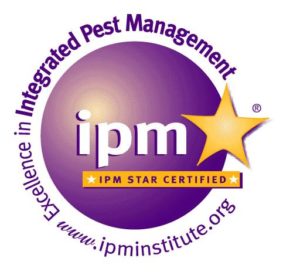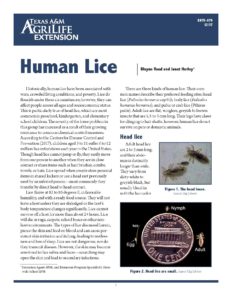AgriLife Extension program bolsters Texas schools’ pest management approach
Writer: Gabe Saldana
More than a decade of work alongside Texas A&M AgriLife Extension Service experts in integrated pest management, or IPM, has culminated in the national certification of four Texas school districts as “IPM Stars,” said Janet Hurley, AgriLife Extension school IPM specialist in Dallas.
 IPM Star certification from the IPM Institute of North America was awarded in April to Plano, Conroe, East Central and Killeen independent school districts for consistent exemplary marks on the institute’s 37-point evaluation.
IPM Star certification from the IPM Institute of North America was awarded in April to Plano, Conroe, East Central and Killeen independent school districts for consistent exemplary marks on the institute’s 37-point evaluation.
IPM is the practice of combining pest control strategies for minimal or zero pesticide use, Hurley said. “Instead of reliance on regularly scheduled pesticide applications, schools using IPM approaches employ proactive pest exclusion practices,” she said. “They emphasize sanitation to eliminate food, water, and harborage for pests, regularly monitoring for pest presence. They use insecticides only when populations are present, and even then, use the least toxic pesticides whenever possible, resulting in cleaner, safer, healthier schools.”
The four districts join Spring ISD, the only other Texas school district to have achieved the national certification. Plano ISD renews its existing IPM Star standing from 2007.
“We have worked with these districts on their IPM programs since about 2001,” Hurley said. “Schools have been required to follow Texas IPM standards since 1995, but those receiving IPM Star certifications have shown themselves to be exemplary in low-human-risk pest management on a national scale.”
The 37-point IPM evaluation that determines an IPM Star certification includes markers like cleanliness for preempting infestation, pest reporting protocols, and pest-control/staff preparedness.
“Maintaining excellence in all these areas is a big undertaking,” Hurley said. “But the certification really shows how Texas school IPM standards stack up nationwide.”
She said the Texas school districts awarded this year were also participants in a 2015 study where AgriLife Extension IPM specialists joined extension programs from across the country to develop a means for standard evaluation of school district pest management programs.
“The evaluation measures we used in that study paralleled those of the IPM Star certification closely enough that we thought our districts could compete successfully for IPM Star recognition, and they have,” Hurley said.
She urged any Texas school district looking to bulk up its IPM approach to reach out to the AgriLife Extension school IPM program by visiting the website, attending one of the two-day workshops, or by contacting directly.
“We want to see Texas schools leading the nation in safe pest control practices,” she said. “This year’s IPM Stars are a sure sign that we’re on the right path.”
Head Lice an old foe
Head lice infest 10 to 12 million people each year in the U.S., making “lousiness” one of the most common communicable conditions in this country. Children transmit lice to one another through the sharing of common items like headphones, ball caps, helmets, and other items that come in close contact with humans and others. It only takes one adult female louse to begin an infestation. Severe infestations may cause irritation, scratching and the subsequent invasion of secondary infection. Head lice are not considered serious vectors of disease. They are normally found on children, but they can spread to adults, too. Household pets do not carry head lice and lice cannot move in from outside.
Last fall, Blayne Reed, Extension Agent-IPM for Hale, Swisher, & Floyd counties and I worked on updating our department head lice document. Download it now so the next time the nurse or teacher ask you to spray you can have this handy for them to read.
Download the full PDF file HumanLice_final
Bat Management
It’s that time of year – bats are on the move and before the summer comes here are a few tips to remember.
Once bats have their pups you should not plan on doing any exclusion work, in some states, it’s illegal to exclude bats. In Texas, we want to protect the bats, but also protect humans and companion animals from rabies.
For more information on bat management check out this past School Pest News article – What everyone should know about bat management
Need to train your staff on how to properly capture a bat, check out this presentation I developed for you to use.
Bat Control In Schools_English


 .
.